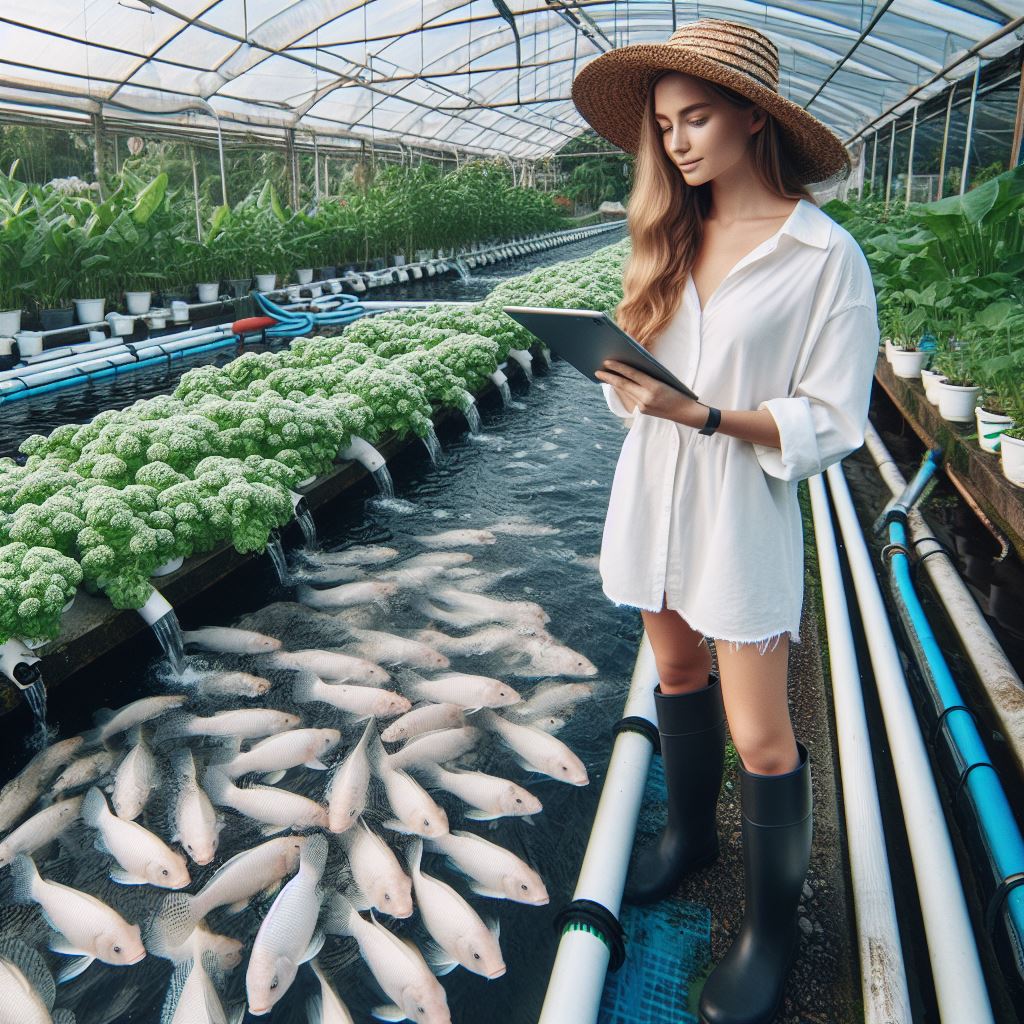Introduction
Sustainable fertilizers are defined as environmentally friendly substances that provide essential nutrients to plants without causing harm to the ecosystem.
These fertilizers aim to nourish crops while minimizing negative impacts on soil, water, and air quality.
The importance of sustainable fertilizers in carbon fixation cannot be overstated.
Carbon fixation refers to the process by which plants convert carbon dioxide from the atmosphere into organic compounds through photosynthesis.
By promoting carbon fixation, sustainable fertilizers help remove excess carbon dioxide from the atmosphere, reducing greenhouse gas emissions and mitigating climate change.
Sustainable fertilizers contribute to carbon fixation in several ways.
Firstly, they enhance soil health and fertility, allowing plants to grow optimally and absorb more carbon dioxide.
Secondly, these fertilizers can improve the efficiency of nutrient uptake in plants, further enhancing their ability to capture carbon dioxide from the air.
Lastly, sustainable fertilizers minimize nutrient runoff and leaching, preventing pollution in water bodies and maintaining a healthy ecosystem.
In short, sustainable fertilizers play a crucial role in promoting carbon fixation and mitigating climate change.
By supporting healthy plant growth and reducing environmental harm, these fertilizers contribute to the global efforts to reduce greenhouse gas emissions and create a more sustainable future.
Adopting sustainable fertilizers is not only beneficial for agriculture but also essential for the overall well-being of the planet.
The Impact of Conventional Fertilizers on Carbon Emissions
Conventional fertilizers
Conventional fertilizers are synthetic substances containing essential nutrients for plant growth.
These fertilizers are typically produced through intensive industrial processes using non-renewable resources.
They are designed to provide immediate nutrient availability to plants, promoting rapid and high-yield crop production.
Transform Your Agribusiness
Unlock your farm's potential with expert advice tailored to your needs. Get actionable steps that drive real results.
Get StartedCarbon emissions from conventional fertilizers
The manufacturing process of conventional fertilizers involves the release of greenhouse gases.
Industrial production methods contribute significantly to carbon dioxide emissions, a major driver of climate change.
These emissions primarily come from the extraction, processing, and transportation of raw materials required for fertilizer production.
Negative environmental consequences of carbon emissions
The release of carbon emissions from conventional fertilizers has several detrimental effects on the environment.
- Climate change: Carbon dioxide emissions contribute to the greenhouse effect, causing global warming and climate instability.
- Air pollution: Carbon emissions from fertilizer production result in air pollution, leading to poor air quality and respiratory issues.
- Soil degradation: Excessive fertilizer use can harm soil quality, leading to decreased fertility and increased vulnerability to erosion.
- Water pollution: Runoff from fields treated with conventional fertilizers can contaminate water sources with excess nitrate, harming aquatic ecosystems.
- Biodiversity loss: Carbon emissions contribute to habitat destruction, endangering countless plant and animal species.
To mitigate these negative consequences, there is a growing need for sustainable fertilizers that reduce carbon emissions.
Read: Water Saving in Animal Farming
Sustainable Fertilizers: A Carbon Fix
Definition and types of sustainable fertilizers
Sustainable fertilizers are organic or mineral-based products that minimize carbon emissions and promote environmental health.
- Biofertilizers: Derived from natural sources like animal manure, compost, or plant residues, they release nutrients gradually, reducing the need for repeated applications.
- Organic fertilizers: Made from naturally occurring minerals, these fertilizers minimize carbon emissions during production while providing essential nutrients to plants.
Benefits of sustainable fertilizers in carbon fixation
- Climate change mitigation: Sustainable fertilizers emit fewer carbon emissions, helping to mitigate climate change and reduce global warming.
- Environmental protection: By minimizing air, soil, and water pollution, sustainable fertilizers protect ecosystems and preserve biodiversity.
- Soil health improvement: Sustainable fertilizers promote soil fertility, organic matter content, and microorganism activity, improving long-term productivity.
- Nutrient efficiency: These fertilizers release nutrients slowly, ensuring plants are not overloaded and reducing nutrient runoff into water bodies.
- Long-term sustainability: Sustainable fertilizers offer a more sustainable approach to agriculture, reducing reliance on non-renewable resources and ensuring future food security.
In essence, conventional fertilizers have a significant impact on carbon emissions, contributing to climate change and environmental degradation.
To combat these issues, the adoption of sustainable fertilizers is crucial.
By reducing carbon emissions and promoting environmental health, sustainable fertilizers offer a viable solution for a more sustainable and resilient agricultural system.
Read: Eco-Friendly Livestock Feeding Tips
Examples of Sustainable Fertilizers
Biofertilizers (e.g., nitrogen-fixing bacteria, mycorrhizal fungi)
Explanation of nitrogen-fixing bacteria
Biofertilizers, such as nitrogen-fixing bacteria, play a crucial role in sustainable agriculture.
These microorganisms have the ability to convert atmospheric nitrogen, which is inaccessible to plants, into a usable form.
They accomplish this through a process called nitrogen fixation.
Nitrogen-fixing bacteria form a symbiotic relationship with certain plants, such as legumes, and reside within nodules on their roots. In return for shelter and nutrients, these bacteria convert nitrogen gas (N2) into ammonia (NH3) or nitrate (NO3-), which can be directly assimilated by plants.
As a result, plants have a readily available source of nitrogen, promoting healthy growth and reducing the need for synthetic fertilizers.
Role of mycorrhizal fungi in nutrient absorption
Another sustainable fertilizer option is the use of mycorrhizal fungi.
These fungi form a mutualistic association with plant roots, forming a network called mycorrhiza.
The fungal hyphae extend beyond the root zone, increasing the plant’s access to nutrients, particularly phosphorus.
In return, the fungi receive sugars produced by the plant through photosynthesis.
This mutualistic relationship improves nutrient absorption and water uptake, leading to enhanced plant growth and overall productivity.
Additionally, the presence of mycorrhizal fungi in the soil improves soil structure and stability, reducing erosion and improving water infiltration.
Benefits of biofertilizers in carbon fixation
Biofertilizers, including both nitrogen-fixing bacteria and mycorrhizal fungi, contribute to carbon fixation and sequestration.
By enhancing plant growth and nutrient uptake, these sustainable fertilizers promote increased biomass production.
Showcase Your Farming Business
Publish your professional farming services profile on our blog for a one-time fee of $200 and reach a dedicated audience of farmers and agribusiness owners.
Publish Your ProfileAs plants grow, they absorb carbon dioxide from the atmosphere during photosynthesis, storing the carbon in their tissues.
Therefore, the use of biofertilizers contributes to the reduction of greenhouse gas emissions, as carbon is effectively captured and sequestered in the soil.
Organic fertilizers (e.g., compost, manure)
Definition and composition of organic fertilizers
Organic fertilizers, such as compost and manure, are also key components of sustainable agriculture.
Unlike synthetic fertilizers, organic fertilizers are derived from natural sources and are rich in organic matter.
Compost, for example, is a mixture of decomposed plant material, food scraps, and other organic waste.
Manure, on the other hand, is animal waste, which when properly composted becomes a valuable fertilizer.
Benefits of organic fertilizers in carbon fixation
- Organic fertilizers improve soil structure by enhancing soil aggregation and water-holding capacity.
- The organic matter present in these fertilizers acts as a food source for beneficial microorganisms in the soil, improving microbial activity and nutrient cycling.
- This, in turn, increases the availability of essential nutrients to plants, promoting their growth and health.
- Furthermore, organic fertilizers contribute to carbon fixation by promoting the accumulation of organic carbon in the soil.
- As organic matter decomposes, carbon is stored in the soil, reducing carbon dioxide levels in the atmosphere.
In summary, sustainable fertilizers such as biofertilizers and organic fertilizers offer environmentally friendly alternatives to conventional synthetic fertilizers.
By harnessing the power of nitrogen-fixing bacteria and mycorrhizal fungi, as well as utilizing organic materials, farmers can enhance nutrient availability, improve soil health, and contribute to carbon fixation and sequestration.
These sustainable practices not only benefit agricultural productivity but also mitigate climate change by reducing greenhouse gas emissions and promoting soil carbon storage.
Read: Urban Farming: Reducing Food Miles

Current Practices and Promoting Sustainable Fertilizers
Adoption of sustainable fertilizers by farmers
- Farmers play a crucial role in the widespread adoption of sustainable fertilizers.
- They should be encouraged to shift from conventional to sustainable fertilization methods.
- Training programs can be conducted to educate farmers about the benefits of sustainable fertilizers.
- Government support and incentives can motivate farmers to switch to sustainable fertilizers.
- Providing financial assistance for the initial cost of transitioning to sustainable fertilizers can be helpful.
- Farmers should be made aware of the long-term benefits, such as improved soil health and reduced environmental impact.
- Case studies showcasing successful implementation of sustainable fertilization can inspire other farmers to follow suit.
- Peer-to-peer knowledge sharing platforms can facilitate the exchange of experiences and best practices in sustainable fertilization.
- Engaging with agricultural communities and farmer associations can create a sense of collective responsibility towards sustainability.
- Farmer-led initiatives and success stories will encourage others to adopt sustainable fertilizers.
Government initiatives and regulations
- Government bodies have a significant role to play in promoting the use of sustainable fertilizers.
- Implementing regulations that limit or restrict the use of harmful chemical fertilizers can drive adoption of sustainable alternatives.
- Creating financial incentives, tax breaks, or subsidies for farmers who adopt sustainable fertilizers can be effective.
- Investing in research and development of sustainable fertilizer technologies can be facilitated by government funding.
- Collaborating with agricultural agencies and organizations to disseminate information is crucial for effective implementation of sustainable practices.
- Policy frameworks should be developed to encourage businesses to produce and market sustainable fertilizers.
- Government-led awareness campaigns can inform farmers about the benefits of sustainable fertilizers and guide them on alternatives.
- Monitoring and enforcing compliance of fertilizer manufacturers and distributors with sustainable practices should be prioritized.
- Regular assessments and evaluations should be carried out to measure the impact of government initiatives on sustainable fertilization.
- Legal measures can be implemented to penalize and discourage the use of environmentally harmful fertilizers.
Raise awareness and educate farmers about sustainable options
- Education and awareness campaigns targeted towards farmers can emphasize the importance of sustainable fertilizers.
- Utilizing various communication channels, such as workshops, seminars, and online platforms, can effectively reach farmers.
- Information about the negative impacts of conventional fertilizers and the benefits of sustainable alternatives should be highlighted.
- Collaborating with agricultural universities and research institutes can provide scientific knowledge and expertise to farmers.
- Demonstration farms can showcase the practical implementation and benefits of sustainable fertilization techniques.
- Creating user-friendly guidebooks and manuals can serve as quick references for farmers transitioning to sustainable fertilizers.
- Establishing farmer cooperatives and networks can facilitate knowledge sharing and collective learning on sustainable practices.
- Engaging with NGOs and community-based organizations can help in reaching out to remote and marginalized farming communities.
- Highlighting success stories and achievements of farmers who have successfully adopted sustainable fertilization methods can inspire others.
- Conduct regular workshops to update farmers on sustainable fertilization technologies and techniques
Research and investment in sustainable fertilizer development
- Continued research and development are essential for the advancement and improvement of sustainable fertilizers.
- Investment in research institutions and universities can lead to the discovery of innovative and eco-friendly fertilization techniques.
- Collaborative research projects involving scientists, farmers, and fertilizer companies can accelerate the development of sustainable options.
- Prioritize long-term funding for sustainable fertilizer research and development.
- Partnerships between public and private sectors can drive investment in sustainable fertilizer innovation.
- Providing grants and incentives to researchers working on sustainable fertilizers can attract talent to the field.
- Encouraging interdisciplinary research can lead to holistic and comprehensive solutions in sustainable fertilization.
- Sharing research findings through scientific publications and conferences can promote knowledge exchange.
- Encourage investment in pilot projects to test sustainable fertilizers’ efficacy across diverse agricultural settings.
- Facilitate technology transfer from research to farmers for practical sustainable fertilization implementation.
By adopting sustainable fertilizers, promoting government initiatives, educating farmers, and investing in research, we can pave the way for a more environmentally friendly agricultural sector.
Together, we can achieve sustainable fertilizer practices that contribute to carbon fixation and safeguard our planet’s future.
Read: Precision Agriculture: Cut Emissions Now
Conclusion
Sustainable fertilizers play a pivotal role in carbon fixation, anchoring the significance of eco-friendly agricultural practices.
Consider embracing these fertilizers as a conscious choice, harmonizing agricultural productivity with environmental preservation.
The adoption of sustainable fertilizers is a practical step towards mitigating climate change and achieving agricultural sustainability.
Encourage exploring eco-friendly choices for a healthier planet and robust agriculture.
As we collectively shift towards sustainable practices, the ripple effect can reshape our agricultural landscape, promoting a greener, more sustainable future.




